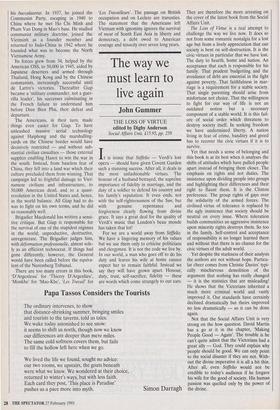The way we must learn to live again
John Gummer
THE LOSS OF VIRTUE edited by Digby Anderson Social Affairs Unit, £15.95, pp. 258 It is ironic that Stiffelio — Verdi's lost opera — should have given Covent Garden such a stunning success. After all, it deals in the most unfashionable virtues. The honour of a husband betrayed, the supreme importance of fidelity in marriage, and the duty of a soldier to defend his country and his family's reputation. It even ends, not with the self-righteousness of the Sun, but
with genuine repentance and forgiveness clearly flowing from divine grace. It says a great deal for the quality of Verdi's music that London's beau monde has taken that lot!
For we are a world away from Stiffelio. We have a lingering memory of his values but we use them only to criticise politicians and clergymen. It is not the code we live by. In our world, a man who goes off to do his duty and leaves his wife at home cannot expect her to remain faithful. Instead we say they will have grown apart. Honour, duty, trust, self-sacrifice, fidelity — these are words which come strangely to our ears.
They are therefore the more arresting on the cover of the latest book from the Social Affairs Unit.
The Loss of Virtue is a real attempt to challenge the way we live now. It does so not from some romantic nostalgia for a lost age but from a lively appreciation that our society is bent on self-destruction. It is the civic virtues in particular that we have lost. The duty to hearth, home and nation. An acceptance that each is responsible for his family. That prudent budgetting and the avoidance of debt are essential in the fight against poverty. That faithfulness in mar- riage is a requirement for a stable society. That single parenting should arise from misfortune not choice. That the willingness to fight for our way of life is not an outdated notion but a necessary component of a stable world. It is this fail- ure of social order which threatens to destroy society itself. In seeking freedom we have undermined liberty. A nation living in fear of crime, banditry and greed has to recover the civic virtues if it is to survive.
Yet that needs a sense of belonging and this book is at its best when it analyses the shifts of attitudes which have pulled people apart instead of bringing them closer. The emphasis on rights and not duties. The insistence upon dividing people into groups and highlighting their differences and their right to flaunt them. It is the Clinton preference. The group rights of gays over the solidarity of the armed forces. The civilised virtue of tolerance is replaced by the ugly insistence that society should be neutral on every issue. Where toleration builds communities an aggressive insistence upon minority rights destroys them. So too in the family. Self-control and acceptance of responsibility is no longer learned there and without that there is no chance for the civic virtues of the adult world.
Yet despite the starkness of their analysis the authors are not without hope. Particu- lar cheer comes from Christie Davies' typi- cally mischievous demolition of the argument that nothing has really changed — it is the statistics that are misleading! He shows that the Victorians inherited a much more criminal world and vastly improved it. Our standards have certainly declined dramatically but theirs improved no less dramatically — so it can be done again.
Not that the Social Affairs Unit is very strong on the how question. David Martin has a go at it in the chapter, 'Making People Good — Again'. The trouble is he can't quite admit that the Victorians had a great ally — God. They could explain why -people should be good. We can only point to the social disaster if they are not. With- out the divine imperative it is all a bit thin. After all,. even Stiffelio would not be credible to today's audience if he forgave his wife for the good of society. His human passion was quelled only by the power of the divine.


















































 Previous page
Previous page